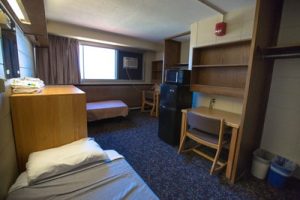Suggestions for Gruenhagen quarantine
October 14, 2020
The COVID-19 outbreak forced UW Oshkosh to make tough choices, and given the decline of testing numbers reported in the previous weeks, the university appears to be making good choices. Spread and contact has been limited thanks to testing and quarantine measures put in place.
Despite the progress being made, there are still a few people testing positive every day. I was recently informed that I came into contact with someone who had tested positive for COVID-19 and was moved to the quarantine housing at Gruenhagen Conference Center.
Though the precautionary measures have been successful, quarantine accommodations were clearly a decision made with haste. It almost leaves those in contact with the virus to feel as though they are being punished, even if they took precautions and followed the rules.

Though this is clearly not the intention, there are certain alterations that should be made to improve the prison-like conditions of Gruenhagen quarantine housing.
Firstly, the quarantine food service seems to be somewhat of a myth on campus. Everyone wonders if it really is as bad as they have heard and what really makes it so.
When you are moved into quarantine at Gruenhagen, they tell you that their catering staff prepares food daily, which sets expectations much too high for the reality of the situation.
Each day you receive a bag of snacks (a very welcome accommodation to those of us who tend to boredom eat) and get access to a table full of ramen, cereal and muffins.
You also have access to a freezer that is restocked each day with fully cooked meals that have been frozen. In theory, this is a great idea, although the foods they choose do not really make any sense for the format at all.
Each day there is a sandwich option, which makes no sense because it requires the bun and all to be heated, leaving you with a soggy plate of gruel if you follow the provided microwave instructions.
Anyone who has ever dined in a restaurant and brought home a carryout box full of leftovers has likely made the discovery that cooked french fries should never be microwaved. It seems that the catering staff has not yet had this experience and often provides meals with a potato option, usually containing french fries or tater tots.
Though this seems like a minor fix, a better selection of meal components would be a major upgrade to the quarantine food options.
Additionally, this fall has seen some of the nicest weather all year, and being cooped up in quarantine means you are only able to observe this through a window that is at least eight stories above the ground.
Given the fact that everyone is stuck in a room for fourteen days, forced to stare out your window as people outside enjoy the outdoors, it is no wonder quarantine quickly takes a toll on mental health. An obvious solution to this might be just allowing people the option to go outside.
Even most prisoners get to step outside for an hour or so a day to protect them from going mad in confinement. It is ridiculous to think that students who have committed no serious or knowing offense are receiving worse accommodations than convicts.
Even requiring students to wear a sign around their neck when outside, letting people know that they should keep their distance, would be an improvement to present conditions. I know I would have gladly worn a scarlet letter if it meant I could get a few breaths of fresh air every day.
Even devoting a small space and time for students to enjoy the outdoors right outside of Gruenhagen is a good way to protect the safety of other students and allow the students in isolation the small break they need from their confinement.
The university is making great strides in preventing the spread of COVID-19, but more attention needs to be paid to details when placing students in isolation. These details could make a world of difference in improving the mental and physical well-being of students.













